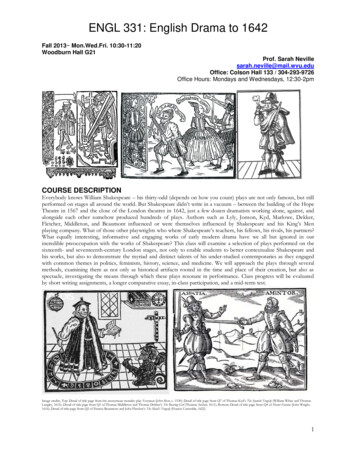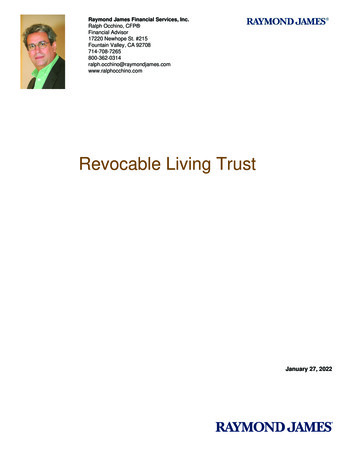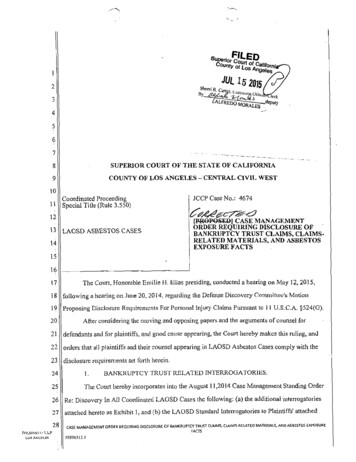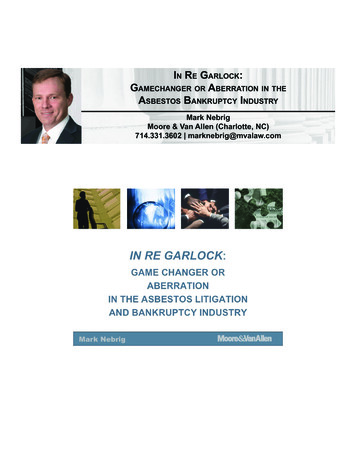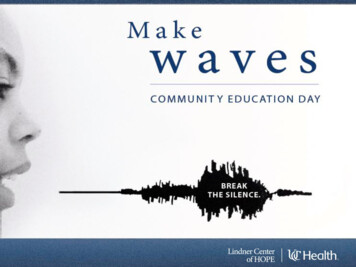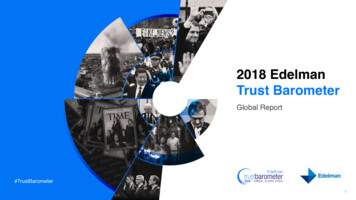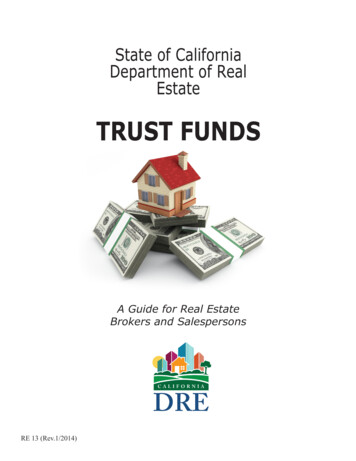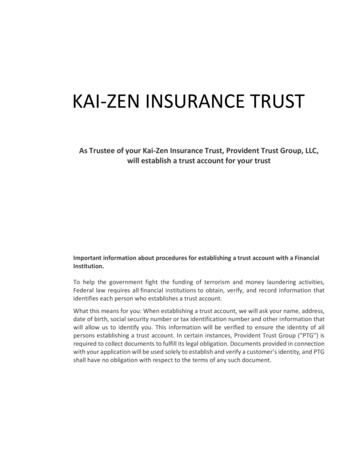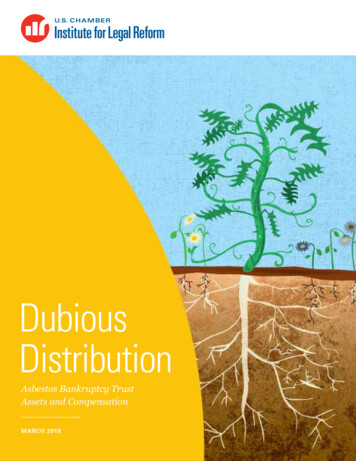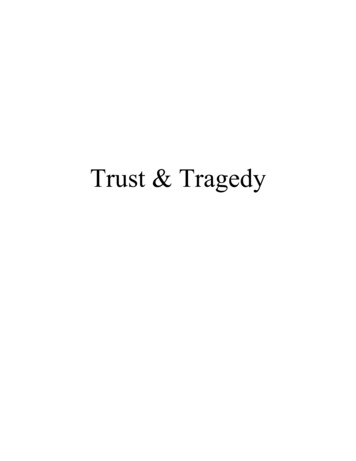
Transcription
Trust & Tragedy
Other Books by Tommy TenneyBestselling SeriesThe God ChasersGod’s Favorite HouseThe God CatchersUnity TrilogyGod’s Dream TeamAnswering God’s PrayerGod’s Secret to GreatnessAdditional Great Resources by Tommy TenneyThe God Catchers WorkbookExperiencing His Presence (Devotional)Chasing God, Serving ManHow to be a God Chaser and a Kid ChaserSecret Sources of PowerExtreme God Chasers (for youth)The Daily Chase (Devotional)The Heart of a God Chaser
Trust & TragedyEncountering God in Times of CrisisTommy TenneyCopyright 2001 by Tommy TenneyThis Trinity Broadcasting Network special was printed by permission of Thomas NelsonPublishers.All rights reserved. Written permission must be secured from the publisher to use orreproduce any part of this book, except for brief quotations in critical reviews or articles.Published in Nashville, Tennessee, by Thomas Nelson, Inc.Unless otherwise noted, Scripture quotations in this publication are from THE NEWKING JAMES VERSION. Copyright 1979, 1980, 1982, Thomas Nelson, Inc.,Publishers.Scripture quotations noted nlt are taken from the Holy Bible, New Living Translation,copyright 1996. Used by permission of Tyndale House Publishers, Inc., Wheaton,Illinois 60189. All rights reserved.Scripture quotations noted niv are taken from the HOLY BIBLE: NEWINTERNATIONAL VERSION . Copyright 1973, 1978, 1984 by International BibleSociety. Used by permission of Zondervan Publishing House. All rights reserved.Scripture quotations noted kjv are taken from the King James Version.ISBN 0-7852-6466-3Printed in the United States of America02 03 04 05 06 PHX 6 5 4 3 2
ContentsForeword vChapter 1 1Tragedy and Towers(Contemporary Crisis—Ancient Response)Chapter 2 8Coming Home from a Funeral(Opportunity Hides in Crises)Chapter 3 14What Is in Your Pocket?(This Is No Time for Judgment)Chapter 4 25We Don’t Know What to Do(But Our Eyes Are upon You)Chapter 5 36Why Do I Feel So Weak?(Discerning the Difference Between aResource and the Source)Chapter 6 49The Demise of a King(The Eulogy of Self-Dependence)Chapter 7 61Presumption Is a Dead-End Street(Spiritual Arrogance Will Divert Your Divine Destiny)Chapter 8 69A Tale of Two Kings and a Veil(Royal Robes of Pride or Humble Coverings of Repentance)Chapter 9 79Who Is Willing to Becomea Signpost of Safety?(Paying the Price to Preserve Divine Purpose and Human Potential)Chapter 10 88Where Do You Go after You
Come Home from a Funeral?(You Must Depose the Old King to Discover the Real King)Chapter 11 97Will You Be Waiting after the Funeral?(Becoming God’s Lighthouse ofCompassion in the Storm of Crisis)Notes 108About the Author 114
Chapter 1Tragedy and Towers(Contemporary Crisis—Ancient Response)Tragedy. Death. Sorrow. Pain.The grim reality lurking behind these words has made the strongest men cry and hasforced entire nations to their knees.Each day thousands face personal tragedy and sorrow. Loved ones slip away intoeternity and medical reports deliver the frightening prognoses we hoped we’d never hear.Marriages wither and die and layoff notices blanket a production floor, snuffing outcountless personal dreams of security and “a better life.”The common sorrows of life often seem impossible to carry. None of us wereprepared when tragedy violently changed the course of human history and establishedSeptember 11 as humanity’s new date “that will live in infamy.”We watched in disbelief while office workers in bloodied dresses and torn businesssuits fled from the burning World Trade Center towers in wide-eyed panic. We saw theimages lurch and sway on our television screens as news camera operators were urged torun for their lives by anxious New York police officers and firefighters fitted in masksand oxygen tanks.Viewers around the world heard the screams from New York’s streets and watchedlive television images of New York’s twin towers collapsing one after another in flamesand smoke. Tragedy never seemed nearer as the bright morning sun disappeared behindthe gloom of a choking cloud of ash. When the dust finally cleared enough for us to graspwhat had happened, all we found was a twisted pile of steel and concrete measuring fivestories high.It didn’t matter that the scene replayed before our eyes over and over again courtesyof the wonder of modern digital technology. Neither did it matter that the scene wasbeamed from one of the world’s most cosmopolitan centers of culture. People were dyingand hearts were breaking.The news from Washington, D.C., and the Pentagon was nearly as grim. There, atleast, the loss of life had been limited to the hundreds instead of the thousands, but thisdidn’t ease the pain of those who would never see their loved ones again.Then the gut-wrenching feelings that were by now all too familiar were ratcheted evenhigher when news broke of a fourth plane that had crashed into a Pennsylvania field.An emotional paralysis set in—the pain and shock were so great that we didn’t dareyield to the feelings of loss, rage, and violation we knew were boiling within.For many, a river of tears broke through at the first sight of brokenhearted firefightersand weeping police officers struggling to maintain their courage in the ashes of what once
was. Others lost control when they glimpsed the gaunt faces of individual familymembers searching for any sign of their loved ones among the living.Praying the Emotional Dam Would Never BurstWhile rescue workers worked around the clock to sift through the ashes and rubble,agonizing hours stretched into days and the chances of survival grew less and less. Yetsome family members still held on, hoping for the best and praying the emotional damwould never burst. They feared they couldn’t survive its fury.The truth is that tragedy seemingly visits every generation. The question is, How dowe deal with it? Especially how, as Christians, do we deal with tragedy—not only tragedyin our lives, but also tragedy visited upon neighbors, whether near or far? Can we “mournwith those who mourn”? Is there purpose buried somewhere in the rubble?The Christian response to tragedy of any proportion—whether it is the collapse ofgreat towers or the collapse of a marriage—should be modeled after Jesus Christ’sanswers in a similar situation.This was not the first time mighty towers in a leading metropolis have fallen andcrushed the hopes of men and nations. Violent events and tragic deaths rocked anotherinternational city with a preeminent position on the world scene. Sometime after a.d. 32, abanner headline shocked Jerusalem citizens: “Tower Collapses, 18 Die!” Perhaps in thesame year, another shocking headline had read, “Pilate Spills Blood of Worshippers inTemple Attack.”1What Do You Think About This, Jesus?These first-century events seem especially relevant right now. Jesus was preaching tothousands of people about understanding right and wrong without hypocrisy when somepeople told Him about a tragedy that had just struck the city. They essentially said, “Whatdo You think about this, Jesus?”Now there were some present at that time who told Jesus about the Galileans whoseblood Pilate had mixed with their sacrifices. Jesus answered, “Do you think that theseGalileans were worse sinners than all the other Galileans because they suffered this way?I tell you, no! But unless you repent, you too will all perish.”2These people weren’t interested in the niceties and intricacy of theological meaning—they wanted to know how Jesus dealt with current events! They weren’t posing somehypothetical problem in search of an equally hypothetical answer. They wanted to knowthen what millions of people want to know now: How does God fit into all of this? Jesus,what do You think about it?Tragedy Struck Its Largestand Most Prosperous City
Jesus didn’t dodge the question, but He did pull His answer from a previous day’sheadlines as well as from those that day. He said:And what about the eighteen men who died when the Tower of Siloam fell on them?Were they the worst sinners in Jerusalem?3Siloam was a well-known district or area in Israel’s largest and most prosperous city,and it was a historic landmark called the “pool of Siloam.” This pool was fed by anunderground aqueduct dug centuries earlier during King Hezekiah’s reign.Evidently a tower of some kind collapsed and killed eighteen people in Siloam. Itseems likely that the tower was part of the city’s protective wall positioned close to thepool. Perhaps, as some speculate, Pilate’s schemes were involved in the catastrophicfailure of the wall that killed so many innocent victims.4We don’t know how many people lived in Jerusalem at that time, but even if only100,000 people lived there, then the sudden and tragic deaths of 18 people would havethe same comparative impact as the tragic loss of more than 5,000 people among NewYork City’s 20 million inhabitants today.Jesus was more interested in giving life and hope than the critics who wanted to pointfingers of blame at innocent victims. He boldly pulled from the current events to establishthe Kingdom of God in the midst of the collapsing kingdom of men.There is no better time for Christian people to be like Jesus than when tragedy strikestheir nation, their city, their neighborhood, or their own homes.Many religious leaders seem to shrink back and disqualify themselves as voices ofleadership and comfort in times of national tragedy. Still others blindly fall into the roleof religious judges proclaiming to the hurting, “See, I told you so.” Jesus didn’t takeadvantage of tragedy to level blame; He drew from current events to bring direction,comfort, hope, and healing in times of need. We must do the same in spite of our personalpain.
Chapter 2Coming home from a funeral(Opportunity Hides in Crises)Tragedy and sorrow are painful, but they nearly always contain hidden opportunitiesfor divine encounters that can transform the future. Isaiah the prophet described hispersonal encounter with the hidden opportunity of grief in his own words: “In the yearthat King Uzziah died, I saw the Lord sitting on a throne, high and lifted up, and the trainof His robe filled the temple.”1Why is this so significant? What does it have to do with the pain we feel today? Itmay be the key you need to unlock your heart and find hope again. As I wrote in mybook, The God Catchers:How many times did this prophet walk into a temple before that unforgettable daywhen he “caught” God? . . . . . Isaiah’s ministry spanned a period of forty years and the reign of as many as fivedifferent kings, but none of them equaled King Uzziah. It is no wonder Isaiah had anencounter with God in the temple—he was just coming back from King Uzziah’sfuneral.2It seems that most Americans instinctively fall to their knees and take their pain toGod when tragedy knocks. Nearly a half-century of “politically correct” foolishness and“separation of church and state” rhetoric fell into ruins just seconds after the first jetairliner crashed into the World Trade Center tower. Hardened network newscasterssuddenly spoke of prayer and God in one breath while Congress convened a prayermeeting—unthinkable events just one tragedy earlier in America’s history.Some of us still remember the heartache that seized the nation on Sunday, December7, 1941, after Pearl Harbor suffered an unexpected and unprovoked sneak attack byJapanese forces that killed 2,403 Americans, including 68 civilians, and wounded 1,178.3President Franklin D. Roosevelt said that day would “live in infamy,” and he was right,but no one dared to believe a worse day or a more tragic loss of life would come our way.Many more remember the shock they felt the day an assassin’s bullets violentlysnuffed out the life of President John F. Kennedy while he waved to American citizenslining the streets of Dallas, Texas, from an open convertible during a presidentialmotorcade on November 22, 1963.I sense an urgent priority in the spirit realm—the Holy Spirit of God is speaking toyou and to me. He is speaking volumes to a nation in pain. God is waiting to meet us onour way home from the funeral. The One who said, “Blessed are those who mourn, forthey shall be comforted” fully intends to comfort us personally if we make the effort todetour from our road of grief to search for Him.4
Let me ask you a personal question: Did you come to God because things were goingso well in your life that you just had to find someone to thank for it? Or did you come toHim in the middle of crisis? What was it that sparked your turn to God?Opportunity hides in the middle of a crisis. I often conduct a “hand poll” in meetingsattended by thousands of people with the same set of questions. The answer is invariablythe same. The truth is that most if not all of us come to God in moments of crisis. Divineopportunity often hides in the middle of human crises.I’ve noticed that whenever my kids get hurt, they insist that Daddy fix their “booboos.” It isn’t because my wife isn’t a skilled healer or comforter, and it isn’t because mychildren love me more than their mother. The reason is much more basic: My childrenknow that I will stretch out the treatment and make it last as long as possible. They thinkall of the parental fussing and the extravagant love and comfort is for them, but it’s reallyfor me. I milk the opportunity for loving parental intimacy with my children.Our heavenly Father may not cause the “boo-boos” of life, but He will take everyopportunity to spend precious moments in divine intimacy with us. Sometimes the onlyway He can gain access to our busy lives is to meet us “going home from a funeral.”We are never more tender than when going home from a funeral. Perhaps you havenoticed that the hardest time doesn’t come during the slow processional from thememorial service or mortuary to the cemetery. There is something oddly comfortingabout the line of cars traveling together in solemn procession with their lights on. At thevery least, we feel “joined” in our grief as we huddle together at the burial site.The hard times don’t become apparent until after the memorial meal or “wake” isover and all of the people are gone. Once the mourners scatter and you begin the solitarydrive home, silence blankets your heart and the reality of your loss sets in.Most of us came to God after the death of something dear, or after we lost a loved oneto death. For some it was the death of a dream; for others it was the death of arelationship or the sudden ending of a career. Perhaps it was the promise of a child’sfuture being shattered by stark reality.Nearly always, we began our search for Him after something awakened a crisisresponse in us. The journey to wholeness began when our brokenness made us realize thatwe have nowhere else to go. It was in the moment of crisis that we suddenly found God’saddress; in our pain His grace led our fingers to the long forgotten “business card” ofDivine Love in our pockets.Suddenly we said to ourselves, This is where I can go. Now I remember; He said thatwhenever there was trouble, I could find Him. It is in the very process of running to Godin a crisis that we realize how often we run from brokenness when God runs tobrokenness. Scripture says, “The Lord is near to those who have a broken heart.”5Why is it that we avoid the very intersection where God said He would always meetus? Whenever there is earthly brokenness there is always heavenly openness, but wedon’t like that address.6 We avoid pain, brokenness, and personal failure at all costs. Wedon’t want to go there because that is not a nice part of town. We would rather live on theproverbial “Easy Street.”The truth is you rarely find God on Easy Street because most of its residents believethey don’t need Him. At the height of their human strength and personal achievements,they boldly thumb their noses at God and those who serve Him. The place most of us find
God is on “Skid Row.” It is the spiritual landing zone for people who have come face toface with their failures, weaknesses, frailty, and loneliness.It is no accident that most of us found God when things were skidding out from underus. Most of us don’t slow down enough to look up until our future looks bleak and thepromise of tomorrow is being snatched from our “today.” This is the moment ofawakening, the point at which you see Him “high and lifted up.” This is the moment oftruth when suddenly you say, “I’m running to the Rock. The name of the Lord is a strongtower! I am running to the Tower that will never fall.”7This is the season of the towers, when men run from the crumbling towers ofhumanity and run to the High Tower for refuge and safety. Human crises birth divineopportunity, and God is patiently waiting to meet us on our way home from the funeral.
Chapter 3what is in your pocket?(This Is No Time for Judgment)In times of crisis, an army of armchair prophets and self-appointed religiousregulators seem to have an especially fierce struggle with what I call the “Aha! spirit.” Itsmost prominent symptom is the nearly uncontrollable urge to point a bony finger atpeople in distress and say, “See? I told you so!”It reminds me of the would-be robber in comedy movies or in stories of a stickupgone awry. The thief pulls a finger from his pocket and jabs it in the back of hisunsuspecting victim, hoping that the person will believe there is a real gun in his back.The mugging proceeds without a hitch as long as the farce goes smoothly, but once thetruth is known, it is “open hunting season” for the weaponless mugger.Jesus was dealing with a group of finger-pointing religious muggers when He wasasked to comment on Pilate’s murder of Galilean worshippers. It is clear from His replythat He knew they wanted Him to take a judgmental stand against the victims who died.These men probably hoped this great teacher would make a public pronouncementabout the obvious existence of some horrible sin in the victims’ lives (and recognize thereligious accusers’ superior wisdom and righteous status in the process).In their narrow view, sin and the harsh judgment it deserves were the only logicalreason for the Galileans’ tragic deaths, but Jesus quickly turned the tables on them. Why?He knew they didn’t have any biblical or moral authority to make such claims. He said:“Do you think those Galileans were worse sinners than other people from Galilee?”he asked. “Is that why they suffered? Not at all! And you will also perish unless you turnfrom your evil ways and turn to God. And what about the eighteen men who died whenthe Tower of Siloam fell on them? Were they the worst sinners in Jerusalem? No, and Itell you again that unless you repent, you will also perish.”1If God were to reward us solely on the basis of our “goodness” or “sinfulness,” weliterally wouldn’t have a prayer. We should thank God that He doesn’t. The only Onewho could declare that such victims were suffering purely because they were sinners andmake it stick was God Himself. Yet Jesus would have none of it.In fact, I read somewhere that “. . . God so loved the world that he gave his one andonly Son, that whoever believes in him shall not perish but have eternal life. For God didnot send his Son into the world to condemn the world, but to save the world throughhim.”2
Will You Extend a Bony Finger or an Open Hand of Love?What is in your pocket right now? Is your hand balled into a tight fist in fear or anger?Are you ready to extend that bony finger of accusation at the “guilty” or extend the openhand of unconditional love and compassion to the hurting and needy?There is a time and season for everything,3 and each person must make an eternaldecision concerning the Lordship and divinity of Jesus Christ, the Son of God. We willall stand before the Righteous Judge someday, but too many of us act as if it is our job tojudge others. The truth is that you will never meet a mere man or woman who qualifiesfor that role.Have you noticed that Jesus delivered His strongest rebukes and judgments toreligious people rather than sinners? The sinners knew they had sinned and didn’t pretendotherwise. Religious people, however, sometimes feel they have earned a special place inGod’s realm even though God says everybody has sinned.Jesus rarely if ever condemned sinners who wanted to be with Him. He didn’t need to.His love and holiness did the work—they were drawn to Him so strongly that they wereprepared to do whatever it took to remain with Him and please Him. They didn’t desire tobe good because they had to; they sought to be good because they wanted to.The Best Answer to CrisisSprings from Our RepentanceWhen a crisis hits a life, a home, a city, or a nation, that is not the time for Christiansto point their fingers and say, “You need to repent—we told you this would happen.” Thereal truth is that the best response in a crisis isn’t rooted in the world’s repentance; itsprings from our repentance. How can that be?Listen to the words of God, who made this statement to King Solomon and theIsraelites . . . and to all God Chasers who would hear the promise in the centuries thatwould follow:If My people who are called by My name will humble themselves, and pray and seekMy face, and turn from their wicked ways, then I will hear from heaven, and will forgivetheir sin and heal their land.4As Christians, we must learn how to raise our voices with more than just accusation.If we read the Scripture passage correctly, God did not say He would forgive our sin andheal our land if the world repents. He specifically said, “If My people who are called byMy name will humble themselves. . . .” In other words, God is saying we have somethinghidden in our pockets to offer to the world. What would that be?Society at large does not have access to the key to revival. Rather, it is hidden withinthe pockets of the Christian family. Each of us is like a cosmic janitor who has so manykeys that he has forgotten what some of them are for. We keep fumbling at the locks ofspiritual and physical bondage and crushing grief that are imprisoning individuals and thenation.While we fumble with the keys of life and point the finger of religious hypocrisy atothers, God is waiting to see us accurately represent Him to the hurting people around us.He entrusted heaven’s keys of freedom and wholeness to us, and He gave us the rightwords to bring healing as well as powerful declarations to set captives free.5
Make Sure You Ask the Right QuestionSince the keys to freedom, healing, and wholeness for the land are in our possessionthrough Christ, the real question isn’t, When will God do something about all of this?Right questions produce right answers. The right question is, When will we do somethingabout it?We may never have a more opportune time in this or any other century to present thereality of Jesus Christ and God’s unconditional love to our hurting world. We have to findour voices and speak up.America is coming home from a funeral, and hearts are tender like never before inthis nation. There is no better time to talk to your neighbors and coworkers than rightnow.Speak with the Right Voice and Pure MotivesYou must find your voice and speak to the people you’ve been afraid to talk to all ofthese years. Just make sure you speak with the right voice and with pure motives, or youmay cause your fellow Christians to be wrongly stereotyped and pigeonholed as religiousand hypocritical bigots. This is the exact place where Satan has always wanted us to stay.My father, T. F. Tenney, sent me these words he had penned for those under hisspiritual care shortly after the attack on the World Trade Center and the Pentagon:It’s time for the church to rise up and be counted. It’s time for us to say to thosewhose grief has receded yet left them more aware than ever before of the aching void intheir hearts and lives that we know the only One who is able to heal and fill them. Assome will be left with a fearfulness about the future, we need to bring them to the Onewho holds tomorrow in His hand. To those who walk without hope, we need to find themand give them eternal hope and help.Author Max Lucado, one of the best-known voices in the modern Christian world,offered an unforgettable prayer that was broadcast live on John Maxwell’s TeamSimulcast four days after the deadly attacks on the World Trade Center and the Pentagon.In the final moments of the prayer, Max prayed:Most of all, do again what You did at Calvary. What we saw here last Tuesday[September 11, 2001], You saw there that Friday. Innocence slaughtered. Goodnessmurdered. Mothers weeping. Evil dancing. Just as the smoke eclipsed our morning, so thedarkness fell on Your Son. Just as our towers were shattered, the very Tower of Eternitywas pierced. And by dusk, heaven’s sweetest song was silent, buried behind a rock. ButYou did not waver, O Lord. You did not waver. After three days in a dark hole, Yourolled the rock and rumbled the earth and turned the darkest Friday into the brightestSunday. Do it again, Lord. Grant us a September Easter.Let Your mercy be upon our president, vice president, and their families. Grant tothose who lead us wisdom beyond their years and experience. Have mercy upon the soulsthat departed and the wounded who remain. Give us grace that we might forgive and faith
that we might believe. And look kindly upon Your church. For two thousand yearsYou’ve used her to heal a hurting world.Do it again, Lord. Do it again.When Tough Men Are Made TenderOn September 11, we found ourselves in a season when tough men were made tender,when it was common to see the most macho of men—firefighters and police officers—crying together in the ashes of yesterday’s dreams. Presidents were praying and evenYankee Stadium was filled with the prayers of the bereaved instead of the cheers ofexultant fans.As I write these words, I am reminded of the statistical evaluation that there are onlysix degrees of separation from one human to any other human on earth. Some unknownvillager in China may be only six relationships removed from you this very moment . . .but tragedy visits every home.Sometimes the force of life’s pain hits us all at once in one great collective blow. Ourpredecessors are familiar with the blows that struck our nation on December 7, onNovember 22, and most recently on September 11.At other times tragedy visits us one soul at a time in the form of terminal cancer, acollision with a drunk driver, the news that a beloved parent has fallen to a massive heartattack, or the heartbreak of miscarriage and the new nursery doomed to remain empty.What Do You Do When Tragedy Strikes?What does the Christian do when tragedy strikes his or her neighborhood? Worse thanthat, what do you do when disaster crashes into your own backyard? How do you recoverfrom the tailspin of life when tragedy strikes your own home?What do you do when the man next door or the daughter of the family across thestreet has died? What do you do when your neighbor’s son is struck down in the bombingof the Federal Building in Oklahoma City, or when your boss’s daughter dies in thesavage suicide attack on the World Trade Center towers?There is a certain season when you plant—you can’t sow seeds when the ground ishard; you sow when the ground is broken up. This is the season for Christians to sowseeds of compassion and love, not judgment. The hurting don’t just live in New York;they also live next door. Every neighborhood is mourning. . . .We need an army of “trained voices” in the land. God has one waiting in the wings ifthey will but answer His call. Isaiah described the “trained voice” of God’s representativethis way:The Sovereign Lord has given me his words of wisdom, so that I know what to say toall these weary ones. Morning by morning he wakens me and opens my understanding tohis will.6We must understand that the One who sent us on this
earthly mission of mercy is serious about the role we’ve taken upon ourselves in Hisname. Again, Jesus said, “God did not send his Son into the world to condemn the world,but to save the world through him.”7This is what you and I were born for. In the words of Mordecai spoken to QueenEsther long ago, “Yet who knows whether you have come to the kingdom for such a timeas this?”8What is in your pocket? It is time for each of us to take off our judge’s robe. We haveno right to stand in judgment with clenched fists and pointed fingers hidden in our robeswhen we hold the keys of revival and restoration in our own pockets.
Chapter 4We don’t knowwhat to do(But Our Eyes Are upon You)If you have ever witnessed a rescue operation at a car crash scene or watched newsreports about emergency crews, then you know that ambulance personnel at an accidentdon’t waste time trying to assign blame—they just want to bandage the wounds andpreserve life. If life is preserved, the details can be sorted out later. We should rememberthat the emergency room is not a courtroom and the day of crisis is not necessarily the dayof judgment.We are heaven’s emissaries of healing, Divinity’s spiritual EMTs (EmergencyMedical Technicians) sent to comfort the brokenhearted. The last time I heard, heaven’sshelves still have plenty of medicine. God simply wants to know who is willing to applythe balm of Gilead, God’s healing anointing to the world’s wounds.It seems to me that too many spiritual paramedics have dropped God’s care packageof love and grace and exchanged their uniforms of mercy for the robes of self-appointedjudges—while trying to exonerate themselves from repentance and judgment in theprocess. Sorry, that job description isn’t in God’s Word.If our repentance is the real key to revival and healing in our land, then I choose toposture myself, as a Christian, in the mode of repentance. This position of humility givesme the credibility to speak the words of healing to others. It gives me my “voice” in theworld.The problem is that when we speak with the wrong voice, we reinforce the unb
Other Books by Tommy Tenney Bestselling Series The God Chasers God's Favorite House The God Catchers Unity Trilogy God's Dream Team Answering God's Prayer God's Secret to Greatness Additional Great Resources by Tommy Tenney The God Catchers Workbook Experiencing His Presence (Devotional) Chasing God, Serving Man How to be a God Chaser .
